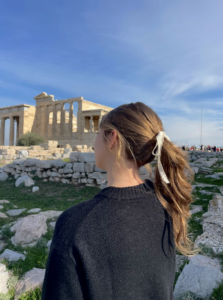The beauty and history in Athens are overwhelming to say the least. I’m finding it difficult to relay all that I’ve seen and learned into words for this post. Long story short: You feel really small when walking on millions of years of history and culture. It’s a terrifying, freeing, and humbling truth that your life and its problems are just a teeny tiny blip in the grand scheme of things. It’s fuel for an existential crisis for sure… but in a good way?
I became an entrepreneurial leadership major for two reasons:
- I want to open a coffee shop one day
- I like to boss people around
So it’s no surprise that our discussions on the socratic method and using it as a function of global leadership caught my interest the most. My goal is to lead people (wherever I end up) to be the best versions of themselves and to help better any organization I may be involved in. This was the exact goal of the ancient athenians as well. Socrates encouraged his followers to have the difficult *and necessary* conversations in order to enlighten themselves and the community. While many didn’t like his approach, we were left with an incredibly useful method of learning and communicating. Rather than listening to a one-sided lecture, having discussions and debates about our topics of interest is a proven way to encourage *actual* learning, not just regurgitation of facts.
Ancient Athenians were chit-chatting about democracy, ethics, etc. all over the place but the site that stood out to me the most was the Orator’s Bema, a set of steps overlooking the entire city. Here, anyone could take the podium to ask questions and challenge others. There’s something very special about the fact that Athens chose that specific spot for its most important conversations. It’s almost like they wanted a reminder of the gravity of their position… a reminder that the decisions they made would affect every man, woman, and child that walked beneath them. Often I feel that our leaders are too far removed from the people that their decisions affect. I think about my mother, a teacher, having to cater to the decisions of a school board who have never once stepped foot into a classroom. Or political leaders who choose to stay in their own bubble rather than reach out to the citizens they’re leading.
This trip has humbled me in more ways than one. I’ve realized that I want to be an empathetic leader who doesn’t shy away from tough conversations, but welcomes them. Connection is the greatest catalyst for growth.

